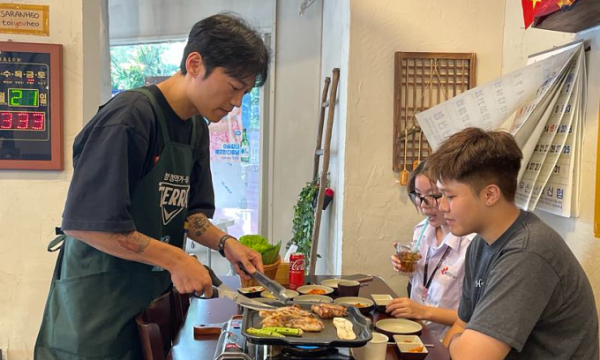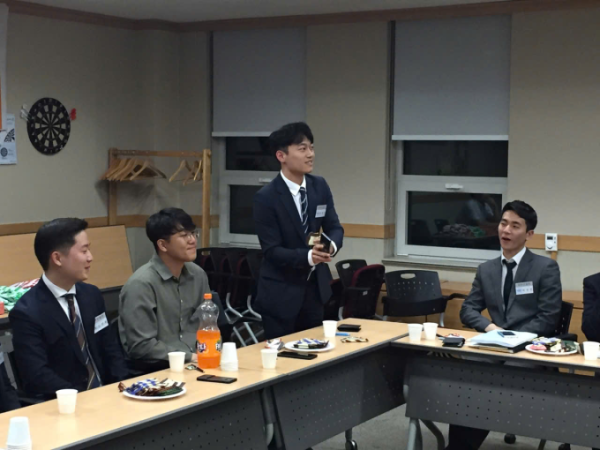
He quickly washes the greens, slices the meat, prepares sauces, and takes them to his Korean barbecue restaurant on Phan Van Tri Street 500 meters away.
At around 10 a.m. the day’s first three customers arrive. From that point until past midnight he is constantly on his feet.
“I have lost seven kilograms in six months in Vietnam because I have been so busy,” he says. “But I feel much happier now.”
Choi, 33, is from Jeju Island, South Korea. In 2009 his father relocated to Vietnam for work and brought him along. He spent his final two years of high school in HCMC.
As a 17-year-old, his early impressions of the city were filled with motorbikes and people littering in public. There were children his age begging on the street or smoking.
But by the third week he began to notice something else: the warmth of the people around him. As his father was occupied with work, a motorbike taxi driver would take him to school every day. Though they did not share a common language, the driver made an effort to chat and always got him breakfast.
His first encounter with Vietnamese fish sauce left a lasting impression. It was salty at first, but its strange aroma lingered in a pleasant way, he says. In public parks, strangers would start friendly conversations with him, something he says is considered “strange” in South Korea.
After high school he returned to South Korea to complete military service and attend university, and landed a job at a real estate firm in Seoul. After six years he became a department head earning a salary many would envy.
“But I did not feel happy,” he says. “Every day felt like a monotonous cycle.”
|
Choi Won Jun serves customers in his Korean barbecue restaurant in Phan Van Tri, HCMC. Photo by Read/Ngoc Ngan |
In South Korea, the bali bali (hurry hurry) culture places strong emphasis on speed and productivity, he says. Every day he had to work at high intensity and strictly conform to order, principles and efficiency. After nine hours at work he had no energy left for anything other than sleeping.
During this high-pressure routine, memories of Vietnam would surface: sidewalk banh mi stalls where people sat sipping coffee and chatting before heading to the office. He visited Australia and Malaysia, but only in Vietnam did he feel a sense of calm and unhurried life.
He wanted to quit his job and move to HCMC, but his family urged caution, reminding him he had worked hard to reach his current position. One day while driving, he realized the radio program on his car stereo always started exactly as he entered a tunnel.
“It made me wonder, am I just a robot? What is the meaning of my life?”
That moment helped solidify his decision. He spent six months learning to cook and resigned at the beginning of 2024.
Three months later he landed in HCMC and began a new life. He rented an apartment in Go Vap District, choosing to avoid the Phu My Hung area in District 7, where most South Koreans live.
He says he enjoys chatting with Vietnamese people, as it helps him better understand the culture. He has made good friendships with vendors at his local Phan Van Tri market.
His Vietnamese friends have introduced him to fermented shrimp paste sauce and taught him how to reduce its pungent smell using cooking oil and sugar. During a motorbike trip to Da Lat in the Central Highlands, he made frequent stops to sample street food along the way.
“All my stress melted away,” he says. “Vietnamese people shared their cuisine with me, and now I want to do the same with food from my homeland.”
 |
|
Choi Won Jun (standing) while working at a real estate company in Seoul, South Korea, in 2024. Photo courtesy of Choi |
Late last year he used his savings to open a Korean barbecue restaurant. At first he did everything himself, from handwriting Vietnamese signs and decorating the place to framing artwork and preparing all the ingredients.
Seeing him struggle, locals stepped in to help even without being asked. A longtime friend of his father’s volunteered to help run the restaurant. The local market’s security guard handed out flyers on opening day and was also the restaurant’s first customer. Local women taught him how to choose fresh vegetables, haggle and attract customers.
“I was showered with help and kindness, even from strangers,” he says.
Since launching the restaurant, he has worked more than 12 hours a day, often until 2 a.m., even longer than he worked back home.
“But I feel much more at ease,” he says. “I am in control of my time and love what I do. Each day brings new experiences, even when facing difficulties.”
Initially he thought he understood Vietnamese culture. But while serving customers, he noticed differences in dining etiquette.
Vietnamese people often eat kimchi soup at the end of a meal, whereas in South Korea, it is served with rice and grilled meat. This made his soup seem salty and spicy to local diners. He also observed that drinking alcohol like soju and beer during meals, a key part of Korean barbecue culture, is not common among Vietnamese, who focus on savoring the flavors of the food.
“Vietnamese customers are not impatient or hot-tempered,” he says. “They gently give me feedback to help me improve.”
He added that their patience helped him gradually understand the language and eventually speak it fluently, despite never taking a formal class.
In mid-March his mother called from Seoul, and was surprised to see how much weight he had lost. But when he showed her a receipt from the security guard who visited his restaurant on the opening day, a memento he keeps, and narrated stories of how locals helped him, her concerns faded.
Seeing his face beaming with happiness, she understood why he chose to live in Vietnam. “I have never regretted my decision to leave.”